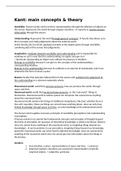Notes de cours
Summary on Kant's main theories (High Enlightenment II)
- Cours
- Établissement
Summary of the lectures and literature on Kant for the subject of the High Enlightenment II of the EUR. Also useful if not following this subject if you need information on Kant his concepts and theories.
[Montrer plus]



